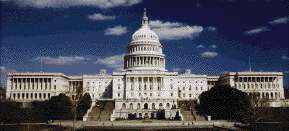
As part of Congress' effort to help federal agencies meet their legislated requirement of offering telecommuting to 25 percent of their eligible workers this year, the U.S. General Accounting Office (GAO) was asked to identify and compare barriers to telecommuting in both the private and public sectors.

|
Bob Robertson,
director of Education, Workforce and Income Security Issues for the GAO, told
Congress, "The most frequently cited obstacle to increased use of telecommuting
related to management concerns." OPM's June 2001 report on federal agency
efforts to establish telecommuting policies identified similar potential barriers.
The Federal Office of Policy and Management reported that its survey of 97 federal
agencies showed that management reluctance was the most frequently cited barrier
to increased telecommuting among federal employees.
The push to get substantial numbers of federal employees working from home began
last year when Rep. Frank Wolf (D-Va.) wrote a provision into a Transportation
Department appropriations bill that directed federal agencies to establish telecommuting
policies and permit 25 percent of their qualifying employees to start telecommuting
this year. The bill would make telecommuting available to all eligible federal
agency employees by 2004.
The federal government also has the challenge of competing with the private sector in recruiting and retaining a qualified workforce. "In a tight job market one way to get and keep workers is to offer certain benefits," said GAO's Dan Bertoni adding that, "telecommuting is a way to do that."
The GAO report says perhaps the biggest challenge to establishing and expanding telecommuting programs are management's concerns with 1) assessing whether the employer has the types of positions and employees suitable for telecommuting; 2) protecting proprietary and sensitive data; and 3) establishing cost-effective telecommuting programs.
A number of current laws and regulations that impact telecommuting were cited in the report. These cover taxes, workplace safety, recordkeeping, and liability for injuries.
One key emerging issue the report notes pertains to interstate telecommuting arrangements where it is possible increased tax liability for the employer and employee could be imposed by tax authorities from one state against a telecommuter residing in another state.
"Realizing the full potential of telecommuting requires looking beyond internal management concerns to the laws that govern an organization's operating environment," said Robertson. Some of these laws were put in place before we could imagine a world in which employees lived in one state, but through technology, worked in another distant state, and as a result, they may unintentionally discourage telecommuting." In his Robertson added that, "Pursuing the question of how to promote telecommuting is really a question of how to adapt current management practices, and laws and regulations to changing work arrangements that are, and will be, part of the information age in which we now live.
The GAO report recommended that, in addition to resolving regulatory issues, Congress could stimulate telecommuting by offering tax credits to employers who buy equipment needed for such programs.
"This is something senators and representatives have an interest in based on the issues we have: congestion, pollution, and being able to compete with the private sector, and overall quality of life issues" said Bertoni. The GAO could be asked in the near future to do some additional work in any one of those areas covered in the report to help Congress lessen or remove those barriers.
To find out more
about the GAO's report, "Telecommuting: Overview of Challenges Facing Federal
Agencies", please visit our web site at www.telcommuteCT.com.
.